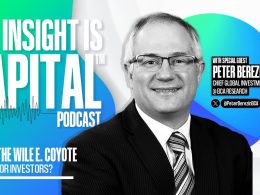by Fahd Malik and Will Smith, High Yield, Fixed Income AllianceBernstein
Fahd Malik: I think the most important thing right now more than ever is being diversified. So the high-income investor needs to think about investing in assets outside of [the] US.
Fahd Malik: The US central bank is ahead of other G10 banks in terms of the credit cycle. So that could lead to US being a center of the storm or center of stress going forward. Secondly, valuations outside of US have gotten fairly attractive, so places—pockets in emerging markets [and] Europe—they have all gotten very attractive from a yield perspective compared to [the] US.
Will Smith: As a high-yield investor, we’re pretty excited when yields are going higher because that means all the cash flow that’s generated in our portfolios is being reinvested at higher and higher yields. Right, so in the short term, we are invested in a fixed-income asset class that, as yields go up, prices certainly go down. But the opportunity set as we see it keeps getting better as yields go higher.
Fahd Malik: Now there is a case where rising rates can cause stress in high-yield markets, and that could happen when we think inflation gets out of control—inflation rising much faster than what’s expected. But our base-case forecast is that while inflation—global inflation—is going to be higher, it’s going to move up slowly. So it should not be a big headwind for high-yield index returns.
Fahd Malik: [At] the same time we are going into a phase where liquidity could be challenged, where central banks are draining liquidity out of the system. So you want to keep powder dry, such that if there are opportunities you should be able to benefit from them. You don’t want to be a seller in a market that’s falling. You want to be buying and putting dry powder to work in that kind of environment.
Will Smith: From a pure credit perspective, there are certain sectors in high yield, for instance, that companies have really benefited from this “rising tide lifts all boat”¬–type mentality, right—where money was very easy [and] balance sheets were very easily refinanced. Now that’s probably not the case. So now you really need to do your deep credit underwriting work to make sure that the names and the sectors that you populate in your portfolios are able to withstand what probably will be more challenging macro conditions—where access to liquidity isn’t quite what it was three, four years ago, where growth probably isn’t quite as strong as it was 12 months ago. So you want to own sectors and names that you feel are very resilient—very resilient business models and very clean balance sheets.
Copyright © AllianceBernstein















